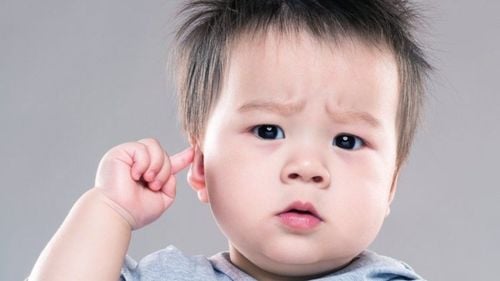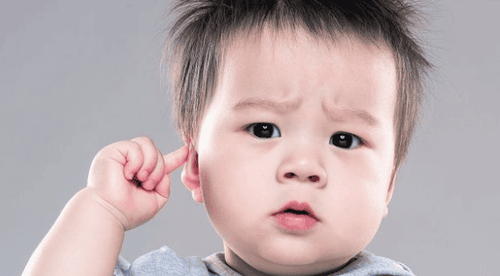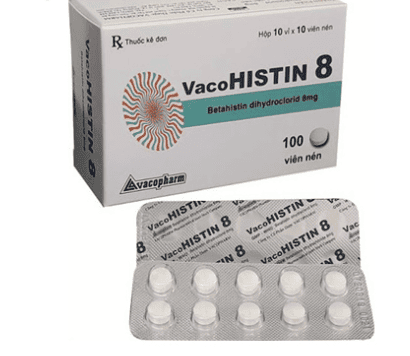This is an automatically translated article.
The ability to hear is extremely important for children because this is an important milestone to help children receive information about sounds from the environment to help them learn and develop. If your child has hearing problems, he or she will be referred to an audiologist. Here, children will be tested with many different methods to determine the degree of hearing loss.
1. Why is hearing screening important for children?
The ability to hear is one of the most important foundations of children. Good hearing helps children learn at their best, so it's important to identify any hearing problems, if any, as early as possible. A child with untreated hearing loss may be slow to reach the developmental milestones of a normal person, especially in language.
Children may have difficulty at school not only in terms of acquisition of knowledge, but also greatly with social skills. Depending on the degree of hearing loss, a child's voice may be affected and sound "different" than other children.
On the other hand, the earlier a child with a hearing loss is diagnosed, the more likely it is that treatment will be successful and the child's language development will be on target.
Even if your child has not been identified as having a hearing loss, he or she should have a hearing test by a doctor at each child's physical exam. When a child is of preschool age or school age, routine testing will likely be done according to a set schedule: for example, once a year or every few years at the beginning of the school year. (You should check to see if your child's preschool or school has such screening requirements and the results of each.) These are simple tests, performed with headphones and an object. The goal is to identify potential problems in the child.
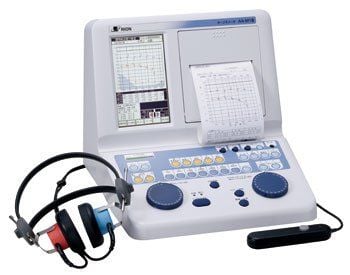
Kiểm tra thính lực giúp đánh giá tình trạng thính lực của trẻ
If there is any cause for concern - or if your child has risk factors for developmental delays or progressive hearing loss - your child's doctor (or school) will refer you to an audiologist (hearing specialist) for further testing.
Of course, at any time you should discuss any concerns you have about your child's hearing and ask for a referral to a specialist.
If your doctor finds that your child's hearing loss could be caused by chronic fluid movement behind the eardrum, he or she may refer you to another specialist, such as an otolaryngologist. throat.
2. What will the audiologist do to check your child's health?
Before an audiologist conducts a hearing test, the doctor will measure the mobility of your child's eardrums with a procedure called tympanometry. The doctor will apply air pressure to the ear canal with a device with a soft plastic tip to find out if your child has fluid in the middle ear or if there are problems with the eustachian tube. If your child has these physical problems, the results of the hearing test could be falsified. These procedures are quick, easy, and painless.
Tests administered by an audiologist will partly depend on your child's developmental and cognitive level. For example, a very young child will not be able to raise his hand as directed when he hears certain sounds. In infants, audiologists determine hearing levels by measuring the baby's brain waves in response to sounds. This can even be done while the baby sleeps.
With younger children, the audiologist pays attention to the child's response to sound. Your child sits on your lap in the center of a soundproofed room with speakers on both sides. When she looks in the direction of the sound, she will be rewarded by seeing a dancing toy or flashing lights. This test is called visual reinforcement audiometry (VRA).
An audiologist records your child's response to different sound levels. (Audiologists look for the softest sound level at which voices and timbres can be heard.) The doctor also notes whether and to what extent your child responds to speech. For example, children may ignore sounds from objects but may recognize a voice.
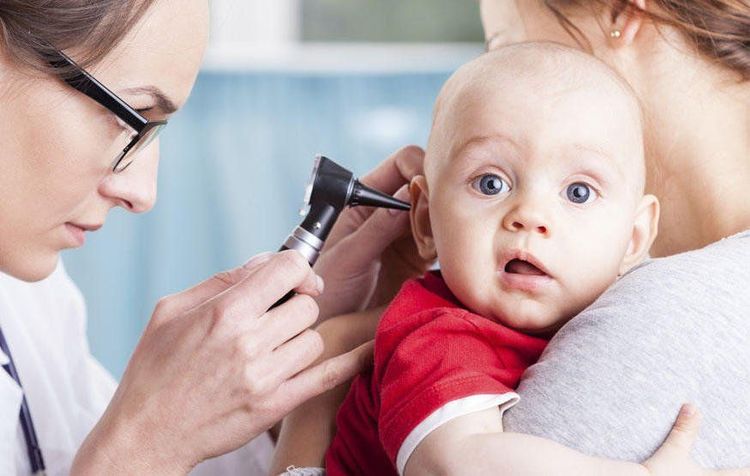
Bác sĩ về thính học kiểm tra thính lực của trẻ
Older children (ages 3 to 5) can be taught to play a simple game, such as dropping cubes into a crate when they hear a sound coming through the headphones. These tests are fun for the child, and the audiologist can get a full picture of hearing in each ear using this technique.
A child 5 years and older can raise his hand or press a button easily when he hears a tone, the same way an adult requires. And the child will be able to repeat the words when asked.
Behavior checking is quite useful. They not only show that your child's ears are hearing sounds, but also that his or her brain is processing them and responding correctly.
Behavioral tests can be done after physiological tests (showing how the child's ears are working) for confirmation. The most common of these tests are acoustic emission (OAE) and auditory brain stem response (ABR). Each test takes about ten minutes and is completely painless.
OAE measures sound waves in the inner ear. The audiologist places a small device in your child's ear to make a gentle clicking sound, and a computer connected to the device records the ear's response to the sound. It only takes a few seconds for the doctor to be able to check for this problem.
The auditory brainstem response (ABR) is used both for newborn hearing testing and in the hands of a pediatric audiologist, for diagnostic testing.
In ABR, electrodes are placed on the scalp, so that the computer can record brain waves in response to the sound coming from the headphones. The audiologist varies the pitch and volume of the signals to determine the level of hearing in each ear.
Together, OAE, ABR and brainwave measurements provide a complete picture of a child's hearing.

Ba mẹ nên cho trẻ đi kiểm tra thính lực định kỳ
3. What if the child does not pass the hearing test?
If the audiologist determines that your child has a hearing loss in one or both ears, he or she will refer you to an otolaryngologist (ENT) for a physical exam. Your doctor can also make recommendations for hearing aids or other assistive technology. If your child is in school, the audiologist will talk to your child's teacher and other staff at the school to make sure they understand your child's hearing loss.
An Otolaryngologist will discuss appropriate options to help your child hear better, such as surgery to clear fluid in the ear. If the problem is not medically treatable, the audiologist will recommend and install a hearing aid (a small electronic device worn inside or behind the ear to amplify sound), the system an FM trainer (selectively amplifies an individual's voice, such as that of a teacher), or a cochlear implant (an electronic device surgically implanted to pick up sound and direct stimulation of the auditory nerve).
Your doctor and audiologist will also talk to you about speech therapy, to help your child learn to speak intelligible. And, if appropriate, they can introduce sign language to your child.
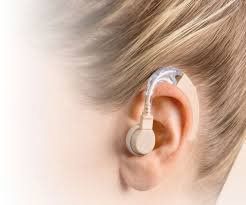
Máy trợ thính có thể được khuyến sử dụng khi không vượt qua bài kiểm tra về thính giác
4. How to detect early hearing symptoms in children.
There are varying degrees of hearing loss and you may not notice a problem, so it's important to get tested regularly. Your child may turn to you when you talk or drop something, but that doesn't mean his hearing is fine. Children can hear some sounds, but not enough for their ability to learn and communicate with their surroundings.
That said, parents and other caregivers are often the first to notice something is wrong, so you should be careful. Talk to your child's doctor if you notice any of these warning signs or are concerned that your child is not hearing well.
Some warning signs of hearing loss in children.
Warning signs: 12 to 18 months
Don't like the game; Does not recognize the names of familiar people, pets, and objects; Does not understand and does not follow simple parental commands such as "come here"; Do not turn your head when you hear the sound coming from the living room; Failure to express desire; Do not imitate simple words; Do not use at least two words; Not responding to music; Do not point at simple body parts or look at familiar objects when asked. Warning signs: 19 to 24 months
Do not say more than five words; Unable to point to at least two body parts when asked; Do not respond with "yes" or "no" to a question or command; Unable to identify common objects such as "ball" or "cat"; Doesn't like being read to; Does not understand questions with a “yes - no” answer “Do you want this?”;; Does not understand simple two-syllable phrases “underground”.
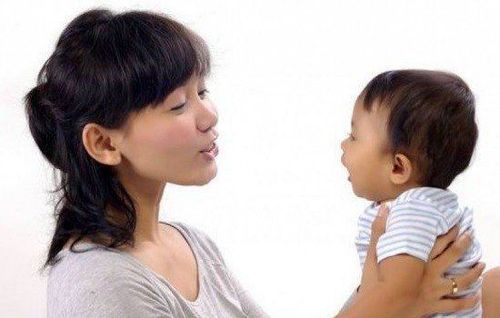
Trẻ nói quá ít có thể là dấu hiệu của bệnh lý về thính lực
Warning signs: 25 to 29 months
Not responding to two-part commands, such as "sit down and drink your milk"; Unable to answer questions about things and people such as "what" and "who"; Cannot create simple two-word sentences, such as "I go"; Not interested in simple stories; Does not understand many action words ("run", "walk", "sit"); Warning signs: 30 to 36 months
Don't understand possessive terms like "mine" and "yours"; Unable to select things by size (such as "large" and "small"); Do not use any plurals or verbs; Do not ask explanatory questions such as "why"; Don't understand "not now" or "no more" statements. Detecting children with hearing loss early will make treatment easier. You should give your baby a general health check. This will help to screen the disease comprehensively, effectively, find the exact cause of the disease.
Currently, Vinmec provides a general health checkup program for young children, helping children outside the newborn age have an in-depth hearing test and find out the exact cause of the disease.
Baby hearing tests are performed by highly qualified and experienced audiologists. Using modern examination techniques, it helps to accurately determine the cause of the disease to apply a reasonable regimen.
Please dial HOTLINE for more information or register for an appointment HERE. Download MyVinmec app to make appointments faster and to manage your bookings easily.
Reference source: babycenter.com






